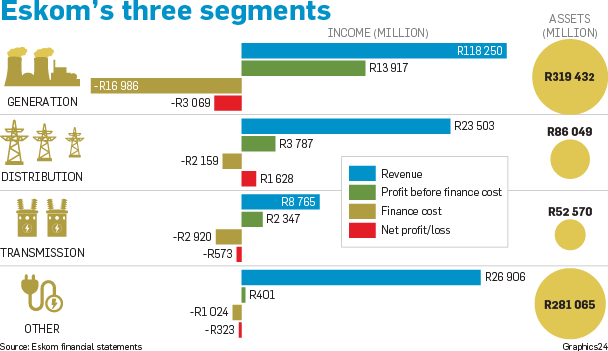
Trade unions are vehemently opposed to President Cyril Ramaphosa’s announcement, made during Thursday’s state of the nation address (Sona), that Eskom will be split into three units – while business and the renewable energy sector largely back this move.
The unions see the unbundling of Eskom into three separate entities – focusing on generation, transmission and distribution – as a step towards privatising the power utility, which they believe would result in job losses and higher power prices.
They vowed to take drastic decision, including not voting for the ANC in the upcoming May elections.
On Friday, National Union of Mineworkers (NUM) general secretary David Sipunzi said: “Depending on the decision of the [NUM] national executive committee we could decide not to vote for the ANC. NUM members are angry.”
He further said that “voting would take place in darkness” as NUM members could switch the lights off. “There has not been any consultation regarding this … It is a very sad day for the NUM,” he added.
South African Federation of Trade Unions (Saftu) general secretary Zwelinzima Vavi said the decision was a declaration of war and they plan to protest in Parliament when Finance Minister Tito Mboweni delivers the budget speech later this month.
Vavi said the federation would embark on a two-day national shutdown strike March 26 and 27 where all its members will be downing tools against the independent Power Producers (IPPs) programme and Eskom’s plans.
Cosatu spokesperson Sizwe Pamla said the federation had no immediate plans other than to wait for government to approach them when consultation process starts but there were two non-negotiables.
“First, is no privatisation as this should not be used as a door for private companies to enter. The second non-negotiable is that there should not be any job losses and retrenchment because of this. This is their mess, they can unbundle five times if they want to but no job should be lost even if it means they have to reskill the workers, they should do that,” Pamla said.
Irvin Jim, general secretary of the National Union of Metalworkers of SA, said: “Ramaphosa confirmed our worst fears, which is that the ANC government has decided to privatise state-owned enterprises (SOEs) ... This is nothing more than privatisation through the back door and we reject it.”
Jim said only a state-owned Eskom could guarantee cheap electricity for ordinary taxpayers.
“The ANC is punishing workers for its failures. The unbundling of Eskom will result in massive retrenchments and job losses. For the consumer, it will mean that electricity will cost more, and it will be even more inaccessible to the poor and working class.”
Capital Economics economist John Ashbourne said that dividing the utility firm was “a necessary, though insufficient, step towards privatising it”.
In a statement on Friday addressing Eskom employees, Minister of Public Enterprise Pravin Gordhan said “this is a great moment for Eskom”.
Gordhan said that his first priority was to meet the Eskom board and determine a detailed roadmap to give effect to the Sona announcements. “The public consultation process with stakeholders, and in particular with organized labour, must also commence as soon as possible.”
Last year, the unions fought and won the battle against a move by Eskom CEO Phakamani Hadebe not to increase workers’ wages, citing the utility’s financial woes. In response, union members staged illegal strikes that led to power cuts.
Ultimately, a three-year wage deal was agreed on, which entailed a 7.5% increase for 2018 and 7% increases for 2019 and 2020.
A similar response to Ramaphosa’s announcement could be on the cards.
Eskom spokesperson Khulu Phasiwe said on Friday that the utility was consulting with its staff, including trade unions, regarding the unbundling.
Meanwhile, local business has backed the move, hoping that the unbundling will result in a better-managed electricity system that will see efficiencies such as lower prices and reliable power.
However, some businesspeople expressed concern that if Eskom was privatised, it should be done without benefiting “established interests”.
The proposed split has won the backing of the renewable energy sector, which said it hoped this move would see more procurement of renewable energy.
Jan Oberholzer, Eskom’s chief operating officer, told City Press on the sidelines of the African Mining Indaba, held in Cape Town this week, that as far back as September, the Eskom board was given the go-ahead to work on matters related to the splitting of the utility.
“What is important is that we take organised labour with us – that is critical,” he added.
Oberholzer said that the first change ahead of the unbundling of Eskom would be to change reporting lines in the corporation. Costs would be involved in the “functional unbundling”, added Oberholzer, but these costs had yet to be quantified.
Regarding the effect of this unbundling on jobs, Oberholzer said that this was not yet clear. However, he added, “productivity is not the way it should be”.
“The focus is on making sure that with the unbundled structure, productivity is the way it should be. That will guide what the optimal structure will be.”
Ramaphosa told Parliament this week that splitting Eskom into three state-owned entities would “ensure that we isolate costs and give responsibility to each appropriate entity”.
“Of ... immediate importance is the need for the entity to manage an independent, state-owned transmission grid, combined with the systems operator and power planning, procurement and buying functions,” he added.
“Security of energy supply is an absolute imperative. Eskom is in crisis and the risks it poses to South Africa are great. In responding to this crisis, we are informed by the need to minimise any adverse economic cost to the consumer or taxpayer.”
To try to plug its need for money to cover debt servicing, capital expenditure and mounting losses, Eskom has applied to the National Energy Regulator of SA (Nersa) for significant hikes in power prices over the three years ending March 2022.
It also wants to recover a revenue shortfall of R21.6 billion for the 2017/18 financial year as a result of declining power sales.
The utility has been warned that the more than 15% hike in power prices it is seeking will have a severe effect on the economy, including job losses and the closure of vulnerable businesses.
Eskom is also talking to National Treasury about a record bailout of R100 billion.
Hadebe told City Press on the sidelines of the mining indaba that the bailout quantum depended on what level of power tariffs Nersa would approve. The way that Eskom would get back on its feet would be through cost containment, an above-inflation increase in power prices and the recapitalisation of the utility.
“The enabler to ensure that everything works is the ring-fencing of Eskom into different business units,” Hadebe said, adding that restructuring Eskom into separate units could take two to three years once it received state approval.
Ramaphosa said the government would support Eskom’s woeful financial position, adding that Mboweni would provide more details about this in his budget speech on February 20.
“This we will do without burdening the fiscus with unmanageable debt,” he added, referring to the risk that any extra debt would have on the state’s creditworthiness, currently rated at subinvestment grade by both S&P Global and Fitch.
Economist Thabi Leoka said: “It was clear then – and even before then – that Eskom is too big and too costly. She added that the utility’s increasing requests for power price hikes and its escalating municipal debts were clear signs that the utility was overstretched and the taxpayer was overburdened.
Tanya Cohen, the CEO of Business Unity SA, said they supported the acknowledgment that Eskom was the biggest risk to the fiscus and, in its current state, was unsustainable.
Sandile Zungu, president of the Black Business Council (BBC), said; “We believe this move will simplify and streamline the management of Eskom and enhance its capacity to restructure its debt as well as raise money from the capital markets.”
Brenda Martin, CEO of the SA Wind Energy Association, said the unbundling would open the way for the procurement of new renewable energy.
“This is a welcome change from stop-start procurement over the past three years, which has inhibited investment, jobs and growth in the sector.”
TALK TO US
How do you feel about the proposal to unbundle the power utility?
SMS us on 35697 using the keyword ESKOM and tell us what you think. Please include your name and province. SMSes cost R1.50. By participating, you agree to receive occasional marketing material




 Publications
Publications
 Partners
Partners









